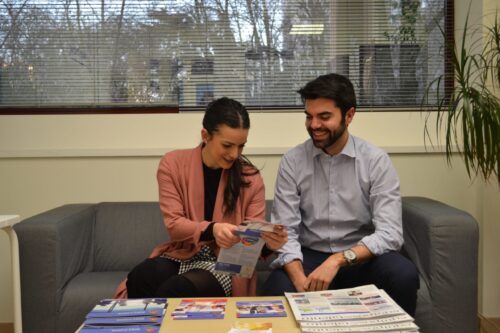¿Qué perfil de estudiante de inglés eres?

La gente con frecuencia piensa que en el aprendizaje de idiomas solo existe un camino para llegar al nivel deseado. Nada más lejos de la realidad. El aprendizaje de idiomas depende de la combinación de objetivos individuales, del tipo de alumno que seas, de la manera que te sientes con respecto al idioma y de la forma en que aprendes. El siguiente artículo pretende abordar este tema desde el punto de vista de la variedad de perfiles de los estudiantes. ¿Te sientes identificado con uno o más de estos perfiles?
!Realmente quiero aprender/mejorar!
Si de verdad estás interesado en el inglés, o en cualquier otro idioma, y quieres mejorar porque te divierte aprender y comunicarte en ese idioma, entonces ¡tienes una ventaja enorme! El placer de aprender es la mejor motivación que hay. Si esto es así, unirte a un grupo en una academia es una gran idea ya que tendrás la oportunidad de satisfacer el deseo de comunicarte con diferentes personas en inglés. Una buena academia te asegurará tener la oportunidad de comunicarte de una manera real, y no simplemente seguir un libro de texto o charlar un rato entre ejercicio y ejercicio. El aprendizaje de un idioma se basa en la comunicación y en el placer de que te entiendan y entender a los demás, y esto debería reflejarse en la manera en que la que aprendes.
La otra ventaja que te dará tu motivación es que seguramente no tendrás problemas para involucrarte con el inglés fuera de la clase. Esto puede ser viendo contenido audiovisual, lecturas cortas como artículos de prensa o lecturas largas como novelas, así como buscando oportunidades para hablar y accediendo a la gran variedad de recursos disponibles en internet.
Si este es tu perfil, tu mayor ventaja es el entusiasmo. ¡No lo malgastes!
Necesito el inglés para el trabajo
Este perfil se puede dividir en dos categorías. La primera es la de aquellos que tienen formación de idiomas financiada, ya sea total o parcialmente por su empleador, y la segunda es la de aquellos que pagan su propia formación para mejorar sus oportunidades laborales. A los de la primera categoría les ocurre con frecuencia que sus compromisos laborales afectan a su asistencia y por lo tanto a la continuidad de su formación. Además, estos alumnos pueden considerar estas clases simplemente como un beneficio que utilizar cuando les viene bien con la consecuente falta de compromiso para sacar el máximo partido de estos cursos. Uno de los factores más importantes en el aprendizaje de idiomas es la regularidad. Si un estudiante tiene dos horas de clase a la semana en grupo y solo asiste al 75% de las clases es difícil que mejore. Por esta razón, los pertenecientes a esta categoría tendrían que desarrollar el entusiasmo de los de la categoría de “desarrollo personal” y poner el aprendizaje de idiomas arriba en su lista de prioridades. Pincha en el link y lee unos consejos sobre aprendizaje cuando no puedes dedicarle demasiado tiempo.
Los de la segunda categoría, que quieren mejorar sus habilidades de comunicación cuando ya tienen un buen nivel para comunicarse, tienen la motivación pero quizás les falta la oportunidad. De nuevo, una buena academia debería ser capaz de ayudar a sus alumnos a concentrarse en las habilidades de comunicación del siglo XXI que les ayudarán en sus vidas profesionales. Esto incluye formas de presentar la información o habilidades para convencer, cómo participar en una conversación en grupo (como una reunión) y en general usar el inglés de una forma práctica para conseguir resultados en el mundo real. El concepto de “ingles de negocios” es muy común en el aprendizaje del inglés, pero ¡el 99% del inglés de negocios es como cualquier otro inglés! Lo importante con los idiomas es ser capaz de comunicar tus ideas y entender las de otros, ya sea en el trabajo o en cualquier otro sitio. Un buen curso de “Inglés General” te ayudará a ser mejor comunicador en cualquier situación.
No estoy seguro de qué tipo de inglés necesito
Quizás has estado en una clase de inglés, principalmente en niveles altos, y hayas pensado “¿Por qué estoy aprendiendo esto?”. Tal vez te estén enseñando vocabulario nuevo que no se te ocurre en qué situaciones vas a poder utilizar, tu profesor te está dando frases o estructuras que solo se usan en su país de origen, o estás volviéndote loco aprendiendo de memoria 200 phrasal verbs cuando lo único que necesitas es hacerte entender. Si este es el caso entonces necesitas meditar sobre tus prioridades. Si tu interés por el inglés es cultural e intelectual entonces el vocabulario avanzado o expresiones del idioma específicas de una zona geográfica te resultarán de interés. Sin embargo, si tu prioridad es, por ejemplo, comunicación de negocios en inglés con países europeos, entonces necesitarás un inglés práctico “global” que otorga mayor importancia a la inteligibilidad que al uso nativo del idioma. También puede ser que te estés preparando para vivir en un país extranjero, en cuyo caso deberías centrarte en cómo se habla el inglés en ese lugar en particular. La clave es llevar a cabo un análisis exhaustivo de porqué estas aprendiendo inglés y pensar en qué versión del inglés necesitas centrarte. Tu profesor puede ayudarte con este análisis y se sentirá muy agradecido de tener un plan claro que se ajuste a tus necesidades. Obviamente, la adaptación de las actividades de clases dependerá de si tu clase es individual o un grupo. En el segundo caso el tipo de inglés que aprendas depende de un consenso grupal.
Una idea que persiste sobre el aprendizaje de inglés es que es mejor tener un profesor nativo. Aparte del hecho de que cada vez es más difícil definir exactamente qué es un hablante nativo, tener un profesor nativo no tiene ninguna ventaja especialmente cuando tus necesidades tienen más que ver con el inglés global o con un tipo de inglés con el que tu profesor nativo no está más familiarizado que tu profesor no nativo. Pensar en qué tipo de inglés necesitas es clave para decidir cómo estudiar y cómo de efectivo está siendo tu progreso teniendo en cuenta tus necesidades.
¡Me he quedado atrás!
Este perfil pertenece a la persona que tiene un bajo nivel de inglés y de repente se da cuenta que están en desventaja cuando compiten por un trabajo. Es bastante común para la gente de este perfil sentir pánico por su situación. Nuestro mensaje es que te relajes y pensar a largo plazo. Se puede alcanzar un progreso real en un periodo de tiempo relativamente corto siempre y cuando trabajes con un plan personal de desarrollo. Inténtalo consultando con una academia de idiomas donde cuenten con la experiencia y la perspectiva para ayudarte. ¡No te desesperes y toma el control!
Quiero aprobar un examen
Algunos exámenes, como el TOEFL y el IELTS y en un grado menor TOEIC o BULATS, son solo herramientas para evaluar el nivel del estudiante. Por esta motivo, la preparación para estos exámenes deberías conocer de antemano el nivel que necesitas alcanzar (por ejemplo, para una plaza de universidad o para un trabajo) y llevar a cabo una evaluación realista del tiempo y el esfuerzo que necesitas para conseguir ese nivel. Seguro que tu academia de idiomas puede ayudarte con esta evaluación.
Por otra parte, otros ejemplos como los exámenes de Cambridge establecen un punto de referencia que el candidato tiene que alcanzar para obtener la calificación del nivel respectivo.
La clara ventaja de estos tipos de exámenes es que el estudiante tiene un objetivo claro y conocimiento de qué tienen que aprender para satisfacer los requisitos del examen. Dichos objetivos pueden ser muy motivantes. La desventaja es que este tipo de formación es menos comunicativa y más centrada en determinados conocimientos del idioma y del vocabulario. Por esta razón, la preparación del examen como forma de mejorar el nivel de inglés es quizás mejor para un perfil de estudiante que prefiere centrarse en el estudio y “entenderlo” dedicándole menos tiempo a la fluidez y comunicación oral.
¡Solo quiero hablar!
El perfil opuesto al estudiante que quiere aprender todas las reglas y asegurarse un conocimiento “perfecto” del idioma es aquel que quiere usar el idioma y aprenderlo mientras lo usa. Este perfil de alumno quiere usar el idioma como una herramienta de comunicación y está más preocupado en hacer llegar su mensaje que producir el idioma correctamente. Este estilo de aprendizaje es quizás más apropiado para clases individuales o para grupos pequeños, y un buen curso en una academia puede conseguir mantener a este perfil de estudiante involucrado y entusiasmado en su aprendizaje manteniendo alto el contenido comunicativo. En King´s Training creemos que se puede lograr un equilibrio entre un aprendizaje a través de una comunicación real y el estudio estructurado siempre con un programa planeado.
Parece que nunca mejoro
Muchas personas tienen problemas para empezar o para alcanzar un nivel intermedio y parece que nunca consiguen dar el salto a un nivel realmente útil. Esto puede ser muy desmotivador y puede hacer que algunos estudiantes crean que no pueden mejorar y tiren la toalla. Las razones de esta incapacidad pueden ser muchas, pero un problema común es el no saber identificar qué tipo de estudiante es y adaptar su programa de forma acorde. Hay gente que puede ser más visual, auditivo o kinestésicos (centrado en el movimiento); quizás prefieran ver el idioma en su conjunto o centrarse en los detalles; igual necesitan planear cuidadosamente actividades o prefieren un aprendizaje más espontáneo. Un buen profesor tiene que ser capaz de reconocer el tipo de aprendizaje que conviene a las personas de este perfil y apoyarle. Además deberá abrirle los ojos a las oportunidades que existen para aprender fuera de la clase y motivarlo para que tome el control de su propio progreso.
Necesito prepararme para un evento específico
Este perfil de estudiante tiene unas necesidades específicas, ya sean profesionales o personales: por ejemplo, tiene que preparar una presentación, una reunión, un discurso o simplemente escribir un texto. En estos casos el estudiante necesita más un “consultor de idiomas” que un “profesor” porque lo que necesita realmente son habilidades de comunicación por encima de cualquier otra habilidad lingüística; cómo usar el idioma que ya conoce para maximizar el efecto y solo aprender nuevo vocabulario si ello contribuye a su objetivo inmediato. Para dar este servicio una academia de idiomas o centro de formación tiene que ser capaz de ofrecer sesiones individuales con profesionales con experiencia y con gran conocimiento tanto del idioma como de la manera en que utilizarlo de manera efectiva para conseguir diferentes efectos.
Quiero recuperar mi nivel anterior
Este perfil de estudiante ha descubierto que aunque el idioma aprendido no se olvida como puedes olvidar una lista de la compra, si no lo usas se vuelve inactivo y más difícil acceder a él en el cerebro. Por esta razón, un alumno que se comunicaba a un alto nivel en el pasado, ahora encuentra que le falta fluidez y frecuentemente tiene lapsus de vocabulario cuando intenta expresar ideas más complejas. El remedio para esta situación es bastante simple: práctica intensiva de conversación, preferiblemente con un formador de idiomas que proporcione feedback y sugerencias para mejorar. En general, los estudiantes de este perfil se dan cuenta que recuperan su anterior nivel bastante rápido pero para mantenerlo necesitan asegurarse de que se relacionan con el inglés con más frecuencia y a largo plazo.
¡Necesito mejorar rapidamente!
Este perfil incluye al estudiante que no tiene tiempo en su día a día y decide cogerse un par de semanas o más para hacer un curso intensivo con la intención de darle un impulso rápido a idioma. Esta forma de aprendizaje puede tener el efecto deseado aunque para niveles bajos, sino para todos los todos los niveles, debería considerarse tan solo como un complemento para un aprendizaje extensivo a lo largo del año. En términos cognitivos, cuando aprendes algo rápidamente de forma concentrada es menos probable que sea retenido en la memoria que si lo has aprendido de forma más espaciada con tiempo para revisar la información. Sin embargo, el aprendizaje del idioma no es solo estudiar y recordar, es también uso activo y comunicación constructiva. ¡Si haces mucho de esto en tu curso intensivo o de inmersión entonces habrás aprovechado bien tu tiempo!
Ahora que estoy jubilado, me gustaría aprender inglés
El aprendizaje del idioma se vuelve cada vez más difícil cuanto más mayor es la persona que lo aprende, y la idea de aprender un idioma desde el principio puede parecer intimidante a cualquier edad. Sin embargo, un estudiante principiante de la “tercera edad” puede conseguir un nivel útil de inglés siempre y cuando su curso esté adaptado a sus intereses y avance a un ritmo adecuado a sus necesidades. Por supuesto, un interés genuino y el deseo de aprender son indispensables para este perfil, que pueden venir del deseo de comunicarte con nuevos amigos o miembros de la familia o solo de un interés recuperado de una época de tu vida anterior y más ocupada.
No me gusta estudiar inglés
Este es, quizás, el perfil más “difícil” de todos. Si crees que este es tu perfil quizás sea porque tu motivación para aprender es extrínseca (por ejemplo, por motivos profesionales u otra obligación). Si sientes presionado en la experiencia del aprendizaje es mucho más probable que esta se vuelva negativa: te inventas excusas para no comprometerte con el inglés fuera de las clases, estás frustrado por las incoherencias propias del idioma, te cuesta ver la razón del estudio cuando rara vez te comunicas en inglés en la vida real, etc. Desde este punto de vista, lo más importante aprender a relajarte y disfrutar de la experiencia del aprendizaje. Esto implica cambiar: revisar la forma en la que aprendes y buscar aquellas formas para relacionarte con el inglés que mejor se adapten a ti. También supone el convencerse de que aprender un idioma requiere incluir ese idioma en tu vida como una forma de interactuar con el mundo (hablar, escribir, leer, escuchar). Lee y escucha cosas que te interesen en inglés; habla con tu profesor sobre como las actividades de clase pueden ser adaptadas para motivarte más; intenta encontrar aspectos de la cultura (películas, libros, revistas…) que tú disfrutes; reconoce el amplio mundo de posibilidades que existen en inglés y enamórate de él. Después de eso, ¡aprender será pan comido!
What kind of learner are you (English version)?
People often think about learning languages as if there were only one learning path which everyone joins to reach their target level. Of course, this is not the case. In reality, language learning depends on a combination of individual objectives, the type of learner the person in question is, how they feel about the language and how they actually learn. The following post is a perspective on this issue from the point of view of the different learner profiles out there. Can you identify yourself in one, or more than one, of these profiles?
I REALLY WANT TO LEARN/IMPROVE!
If you are genuinely interested in English, or any other language, and want to improve because you really enjoy learning and communicating in that language, then you have a huge advantage! Pleasure in learning is the best motivation there is. If this is true of you then joining an academy group is a great idea as you will have the chance to satisfy the desire to communicate with different people in English. A good academy will ensure that you have the chance to communicate real meaning, not just to move through the different sections of a coursebook or talk a little bit between exercises! Learning a language is ultimately all about communication and the pleasure of being understood and understanding other people, so this should be reflected in how you learn.
The other advantage that your motivation will give you is to engage with English outside of class. This can be watching audiovisual content, short reading like press articles or long reading like novels, as well as looking for speaking opportunities and accessing the vast resources available on the internet.
If this is your profile, your greatest advantage is your enthusiasm. Don’t waste it!
I NEED ENGLISH FOR WORK
This profile can be separated into two main categories. The first is when the learner receives language training fully or partly funded by their employer, and the second is when the student pays for their own training to improve their professional opportunities. Students in the first category often find work commitments limit their attendance which creates problems of continuity. Students might also consider these classes as a ‘perk’ to be used when it is convenient and thus lack commitment to making the most of the course. One of the most important factors in language learning is consistency. If a student has two hours of class a week in a group and they only attend 75% of classes they are unlikely to improve. For this reason, students in this category also have to find the enthusiasm of the ‘personal development’ category and put language learning higher on their list of priorities. Follow the link for a useful tip about learning when time is short:
People in the second category, who want to improve their communication skills when they already have a decent communicative level, have the motivation but perhaps lack the opportunity. Again, a good academy should be able to help people in this category in that they should be helping students focus on twenty-first century communication skills which will help them in their professional lives. This includes presenting information or presentation skills to persuade, participating in group conversation (as in a meeting) and generally using English in a practical way to achieve results in the real world. The concept of ‘business English’ is very common in the world of English language learning, but 99% of business English is just like any other English! The important thing with language is to be able to communicate your ideas and understand those of others, whether at work or anywhere else. In order to do that you need to practice the relevant communication skills: giving a presentation on your work responsibilities uses essentially the same language as giving a presentation on your favourite TV programme, for example. A good ‘general English’ course will help you to be a better communicator in any situation.
I’M NOT SURE WHAT KIND OF ENGLISH I NEED…
You may have been in an English class, especially at higher levels, and thought ‘why am I learning this?’ Perhaps you are learning vocabulary from news articles that you can never imagine actually using, or your teacher is giving you phrases or structures only used in their country of origin, or you are going crazy learning 200 phrasal verbs when you just need to get your message across. If this is the case then you need to think about your priorities. If your interest in English is cultural and intellectual then low-frequency (advanced) vocabulary and geographically specific language will be of interest to you. However, if your priority is, for example, business communication in English with European countries, then you will need a practical ‘global’ English which places more importance on intelligibility than native language use. However, you may be preparing to live in a foreign country, in which case you might want to focus on how English is spoken in that particular place. The key is to carry out a thorough needs analysis of why you are learning English and then think about which version of English you need to focus on. Your teacher can help you with this analysis and will be grateful to have a clear plan to meet your needs. Obviously, the adaptation of class activities will depend on whether your class is one-to-one or in group. In the second case the kind of English you will learn depends on a group consensus.
An idea about English learning which persists even today is that it is better to have a ‘native’ speaker as a teacher. Aside from the fact that it is increasingly difficult to define exactly what a native speaker is, having that native speaker is of no particular advantage especially when your needs are more in line with global English, or a kind of English which your ‘native’ teacher is no more familiar with than a ‘non-native’ teacher. Thinking about what kind of English you need is key to how you learn and how effective your progress is according to your needs.
I’VE BEEN LEFT BEHIND!
This profile belongs to the person who has a relatively low level of English and suddenly realises they are at a disadvantage when competing for jobs. It is quite common for people in this profile to feel panicked about their situation. Our message for them is to relax and take the long view. Real progress can be made in a relatively short time by working out a concrete personal development plan. This can be done by consulting with a language academy whose representatives will have the experience and perspective to really help you out. Don’t despair – take control!
I WANT TO PASS AN EXAM
Some exams, such as TOEFL and IELTS and to a lesser extent TOEIC or BULATS, are essentially tools to evaluate the level of the student. For this reason, preparation for these exams should include knowledge of the level that you need to get (for a university place or job, for example) and a realistic assessment of the time and effort needed to reach that level. Your language academy or training centre should help you with that assessment.
On the other hand, other examples such as the Cambridge exams set a benchmark which the candidate has to attain in order to be awarded the qualification at the respective level.
The great advantage of both of these exam types is that the learner has a clear target and knowledge of what they have to learn in order to satisfy the requirements of the exam. Such objectives can be very motivating. The disadvantage is that this kind of language training is likely to be less communicative and more focussed on accurate knowledge of language over the successful communication of meaning. For this reason, exam preparation as a way of improving English level is perhaps better for a profile of learner who prefers to focus on study and ‘getting it right’ with less time spent on fluency and spoken communication.
I JUST WANT TO TALK!
The opposite profile from the learner who wants to learn all the rules and ensure a ‘perfect’ knowledge of the language is the one who wants to use the language and learn while using it. This profile of learner wants to use the language as a communication tool and is concerned more with getting her message across than producing correct language. This style of learning is perhaps more appropriate to a one-to-one or small group class, but a good academy course should keep this learner profile engaged and enthusiastic about their learning by keeping the communicative content high. At King’s Training we believe in striking a balance between learning through real communication and structured study through a planned programme.
I NEVER SEEM TO GET ANY BETTER
Some people have problems getting started or get to an intermediate level and can’t make the jump to a really useful level. This can be very discouraging and can make some learners believe they cannot improve and even to give up. The reasons for this inability can be many, but a common problem is identifying what kind of learner the person is and adapting their programme accordingly. People may be more visual, audio or kinaesthetic (focussed on movement) learners; they may prefer to see ‘the bigger picture’ or focus on the detail; they may require activities to planned carefully or thrive on learning spontaneously. The point is that a good teacher will be able to recognise the learning type of people belonging to this profile and therefore help them. A good teacher will also open the eyes of their students to learning opportunities outside the classroom and motivate them to take control of their own progress.
I NEED TO PREPARE FOR A SPECIFIC EVENT
This profile of learner has specific needs, whether professional or personal: preparing for a presentation, a meeting, a speech or a piece of writing, for example. In this case the student needs a ‘language consultant’ more than a ‘teacher’ because what they really need are communication skills on top of their language skills; how to use the language they already have to maximum effect and only learning new language when it contributes to their immediate goal. To be able to provide this service a language academy or training centre has to be able to offer one-to-one sessions with experienced staff with an extensive knowledge of both the English language and how to use it effectively to achieve different effects.
I WANT TO RECOVER MY PREVIOUS LEVEL
This profile of learner has found that while learnt language cannot be forgotten like the items on a shopping list, if you do not use it then it becomes inactive and more difficult to access in your brain. For this reason the learner who communicated at a high level in the past now finds that they lack fluency and frequently encounter vocabulary gaps when trying to express more complex ideas. The remedy for this situation is quite simple: intensive conversation practice, preferably with a language trainer providing feedback and suggestions for improvement. Learners of this profile generally find they recover their previous level quite quickly, but to maintain it they really need to ensure they are engaging with English more frequently in the long term.
I NEED TO GET BETTER QUICKLY!
This profile includes the learner who has no time in their day-to-day lives and decides to take a couple of weeks or more out to do an intensive course hoping to give a quick boost to their development as a language user. This way of learning can certainly have the desired effect although at lower levels, if not all levels, it really should be considered as a complement to extensive learning throughout the year. In cognitive terms, when you learn something quickly in a concentrated form it is less likely to be retained in your memory than if you have learned it in a more ‘spaced out’ format with time to revise the information. However, learning language is not only about studying and remembering, it is also about active use and constructive communication. If you do plenty of this in your intensive or immersion course then your time has been well spent!
NOW I’M RETIRED, I’D LIKE TO LEARN ENGLISH
It is generally accepted that language learning gets more difficult as the learner gets older, and the idea of learning a language as a beginner can seem intimidating at any age. However, a ‘third-age’ beginner learner can reach a useful level of English as long as their course is adapted to their interests and proceeds at a rhythm which suits them. Of course, a genuine interest and desire to learn is indispensable for this profile, which may come from the wish to communicate with new friends or members of the family or just from an interest delayed from an earlier and busier period of life.
I DON’T REALLY LIKE LEARNING ENGLISH
This is the perhaps the most ‘difficult’ profile of all. If you think this is your profile it may be because your motivation to learn is extrinsic (a professional or other obligation, for example). If you feel pressured into a learning experience it is much more likely to be negative: you come up with excuses for not engaging with English outside the classroom, you are frustrated by the inconsistencies of the language itself, it is hard to see the point of learning as you rarely communicate in English in real life, etc. From this point of view, the most important thing is learning to relax and enjoy the learning experience. This involves change: reviewing how you learn and looking for new ways to engage with English which suit you better. It also involves making the leap of faith that learning a language requires and accepting the language into your life as a way of interacting with the world (speaking, writing, reading, listening). Read and listen to media about the things which interest you in English; talk to your teacher about how class activities can be adapted to motivate you more; try to find aspects of culture (films, books, magazines…) which you enjoy; recognise the wide world of possibilities that exist in the English language and fall in love with it. After that, learning is easy!





